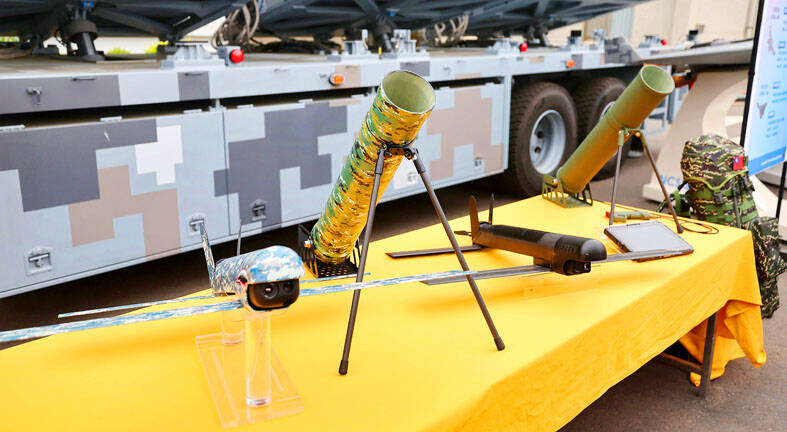A domestically developed “suicide drone,” also known as a loitering munition, would be tested and evaluated in July, and could enter mass production next year, Taiwan’s weapons developer said on Wednesday.
The yet-to-be-named drone was among nine drone models unveiled by the National Chungshan Institute of Science and Technology (NCSIST) on Tuesday.
The drone has been dubbed the “Taiwanese switchblade” by Chinese-language media, due to its similarity to the US-made AeroVironment Switchblade 300, which has been used by Ukraine in counterattacks during Russia’s invasion.

Photo: CNA
It has a range of more than 10km, a flight time of more than 15 minutes, and an electro-optical and infrared system, the NCSIST said.
It is also equipped with a precision high-explosive warhead, and can be carried into the battlefield by infantry to aim at high-value targets, including personnel and vehicles, the NCSIST said.
During an interpellation at the Legislative Yuan on Wednesday, Democratic Progressive Party (DPP) Legislator Chao Tien-lin (趙天麟) asked whether the military would contract the manufacture of the loitering munition.
A manufacturing project and a program to train drone pilots are being planned by the navy, Minister of National Defense Chiu Kuo-chen (邱國正) said.
Operational tests and evaluations of the drone would commence in July, NCSIST President Art Chang (張忠誠) said, adding that if operating capability is deemed acceptable, mass production would begin next year.

‘DENIAL DEFENSE’: The US would increase its military presence with uncrewed ships, and submarines, while boosting defense in the Indo-Pacific, a Pete Hegseth memo said The US is reorienting its military strategy to focus primarily on deterring a potential Chinese invasion of Taiwan, a memo signed by US Secretary of Defense Pete Hegseth showed. The memo also called on Taiwan to increase its defense spending. The document, known as the “Interim National Defense Strategic Guidance,” was distributed this month and detailed the national defense plans of US President Donald Trump’s administration, an article in the Washington Post said on Saturday. It outlines how the US can prepare for a potential war with China and defend itself from threats in the “near abroad,” including Greenland and the Panama

The High Prosecutors’ Office yesterday withdrew an appeal against the acquittal of a former bank manager 22 years after his death, marking Taiwan’s first instance of prosecutors rendering posthumous justice to a wrongfully convicted defendant. Chu Ching-en (諸慶恩) — formerly a manager at the Taipei branch of BNP Paribas — was in 1999 accused by Weng Mao-chung (翁茂鍾), then-president of Chia Her Industrial Co, of forging a request for a fixed deposit of US$10 million by I-Hwa Industrial Co, a subsidiary of Chia Her, which was used as collateral. Chu was ruled not guilty in the first trial, but was found guilty

A wild live dugong was found in Taiwan for the first time in 88 years, after it was accidentally caught by a fisher’s net on Tuesday in Yilan County’s Fenniaolin (粉鳥林). This is the first sighting of the species in Taiwan since 1937, having already been considered “extinct” in the country and considered as “vulnerable” by the International Union for Conservation of Nature. A fisher surnamed Chen (陳) went to Fenniaolin to collect the fish in his netting, but instead caught a 3m long, 500kg dugong. The fisher released the animal back into the wild, not realizing it was an endangered species at

DEADLOCK: As the commission is unable to forum a quorum to review license renewal applications, the channel operators are not at fault and can air past their license date The National Communications Commission (NCC) yesterday said that the Public Television Service (PTS) and 36 other television and radio broadcasters could continue airing, despite the commission’s inability to meet a quorum to review their license renewal applications. The licenses of PTS and the other channels are set to expire between this month and June. The National Communications Commission Organization Act (國家通訊傳播委員會組織法) stipulates that the commission must meet the mandated quorum of four to hold a valid meeting. The seven-member commission currently has only three commissioners. “We have informed the channel operators of the progress we have made in reviewing their license renewal applications, and